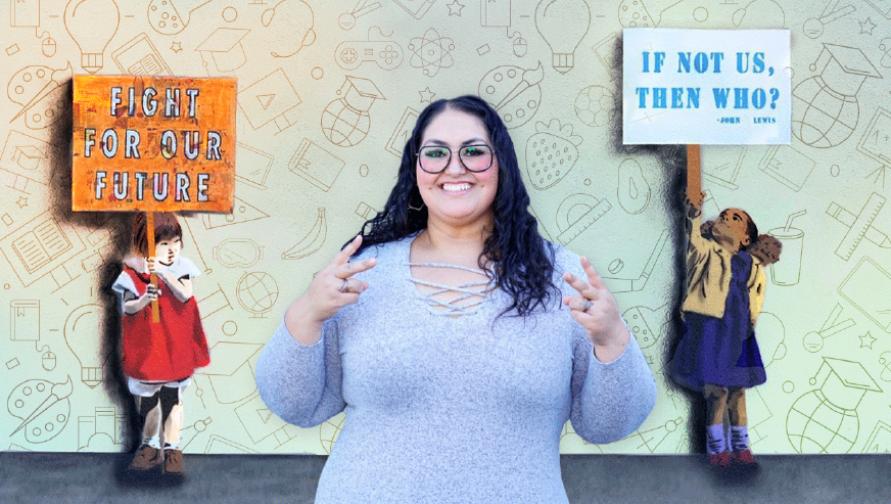
By Megan Cole
Since COVID-19 lockdowns began in March, the usual chorus of cars, buses and hustling children has vanished from the parking lot of Lynwood’s Cesar Chavez Middle School. That silence is broken a few weekends each month, however, when hundreds of families pour in for “pandemic drive-through parties” that provide free groceries, gift cards, baby essentials and other supplies along with entertainment for a few of the South Los Angeles communities hit hardest by the pandemic.
These massive food and resource fairs are the brainchild of Audrey Casas, a Lynwood educator and UCI alumna (B.A. English ’19). Shortly after Casas’ school transitioned to virtual instruction in early March, she worried that many local students reliant on free district-provided food might go hungry during spring break. Pre-pandemic figures indicate that 5.4 million Californians are food-insecure, and 2.3 million of them are children. COVID-19 has exacerbated these figures, especially for those who are ineligible for CARES Act aid such as: undocumented immigrants, workers who don’t file taxes, and young people classified as dependents. In Lynwood, where one in five people live in poverty, many of Casas’ own students had fallen through such bureaucratic cracks.
“Hearing the stories of parents who had lost their jobs and not received any governmental aid, it really set in,” Casas says. “Spring break was coming up – a week when no school meals would be provided. Many kids were getting by on food from the school district alone, but there was no extra revenue coming in, no light at the end of the tunnel, and people did not know where their next meal was coming from. So I thought, ‘What can I do?’”
In April, Casas collaborated with another teacher, Jeff Ballinger, to compile a list of 20 Lynwood Unified School District (LUSD) families in especially dire straits. They set out to fundraise $2,000 — just enough to buy each family a $100 gift card for groceries throughout spring break. The fundraising operation — dubbed Mastering Hope — began informally and, in true pandemic style, entirely online. In a single weekend, through a series of Instagram posts shared and signal-boosted by community members, including prominent voices like KIIS FM host and LUSD alumna Patty Rodriguez, Mastering Hope received over $18,000 from hundreds of donors.
The carnivals have since caught the attention of the community and media alike, with Casas and Mastering Hope being highlighted across several local radio and broadcast news stations. With Casas’ volunteer “Dream Team” of 12 other Lynwood educators and healthcare professionals, the organization has raised over $80,000 to date and has received countless supply donations.
What started as gift card distributions to individual families evolved into organized food drives, and soon into all-out “pandemic parties” serving up to 2,000 families. Casas didn’t want to recreate the “silent, anti-social, almost shameful” aura of the food drives she remembers attending as a child, so while enforcing appropriate health precautions (patrons wear masks, physically distance, and mostly remain in their cars), Mastering Hope’s fairs embody Casas’ life motto: “have fun getting it done.” Casas recruited jugglers, roller derby teams and a live DJ; started soliciting donations of toys and snacks to hand out to kids waiting in their cars; and invited a friend and fellow community organizer to host a free specialty coffee stand for parents. Additionally, the list of resources has grown beyond basic groceries: Mastering Hope provides clothes, school supplies, pet food, and even a pop-up mental health clinic, along with “fun stuff” like candy and gourmet snacks that often go neglected during tough times.
“My whole goal is to confuse people,” she says. “I want them to think they’re at a carnival, where the groceries they get at the end are just a happy bonus.”
For Casas, a Lynwood native and pillar of the city’s educational community, the academic journey has been neither traditional nor easy. The first-generation student was a 35-year-old mother of two when she transferred to UCI in 2017. Casas had dropped out of high school and struggled with substance abuse for years before deciding to become an educator and guide students with backgrounds like hers. At UCI, she majored in English with a specialization for future teachers; this fall, after two decades as an LUSD office manager, she will officially launch her teaching career in the ninth-grade English classroom while simultaneously commencing an M.A. degree in urban education at Loyola Marymount University.
Now the president of Mastering Hope, which has just been granted 501(c)(3) status, Casas learned the fundamentals of both teaching and fundraising as an Anteater. In 2019, during a philanthropy course required for her minor — civic and community engagement — Casas was chosen to represent UCI at The Philanthropy Lab in Dallas, a competition where college students vie for donations to a charity of their choice. Casas and her partner led UCI’s team to its first-ever victory and raised $35,000 for a Santa Ana nonprofit.
“That’s how I got familiar with IRS documents and nonprofits, and learned to deliver fundraising proposals,” says Casas. “Applying principles of storytelling, rhetoric and creativity, being able to make connections and convincingly explain to donors and philanthropists why they should support your cause — that takes skills and strategies that I learned at UCI.”
Even before her latest distribution fair has drawn to a close, Casas is readying herself for the next one. She acknowledges that her work over the past couple of months — juggling roles as an educator, mother, nonprofit organizer and incoming graduate student, all during the pandemic — has been exhausting. But, Casas explains, “Love is action, love is movement, love is hard work...and for Lynwood and the hood, I have a lot of love.”
Follow Casas on Instagram @theaudreymachine or contact Casas to support Mastering Hope at audreycasas@masteringhope.org.
Photo of Casas taken by Adolph J. Lopez & designed by 789, Inc.
